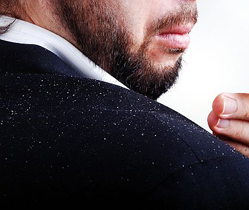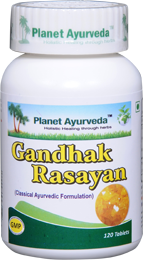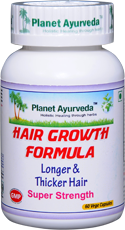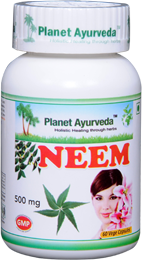 Patchy Scaling of the scalp is called as dandruff. It is a common problem associated with seborrhic dermatitis. It commonly affects the scalp, face, ears, chest and back. The skin looks scaly and flaky with itching and redness of the area below the scales.
Patchy Scaling of the scalp is called as dandruff. It is a common problem associated with seborrhic dermatitis. It commonly affects the scalp, face, ears, chest and back. The skin looks scaly and flaky with itching and redness of the area below the scales.
It can be a very embarrassing condition as the scales keep shedding off from the hair and fall on the clothes and shoulders making one look unkempt and shaggy.
The flakes are usually produced by the excessive scaling of the skin of the scalp. Shampooing can help to continuously wash out these flakes from the scalp skin and hair.
It is generally controllable with the use of medicated shampoos, but in many cases, the dandruff may become chronic.
Symptoms of Dandruff
Dandruff has characteristic symptoms which are easily recognizable and familiar to the common man.
The Common Symptoms of Dandruff are:-
- Itchy, scaly scalp
- White flakes of dead skin that have an oily texture.
Why does Dandruff Worsen During Winters?
During winters there is extreme dryness and a lack of moisture in the environment.
The indoor heating of the houses in winter adds to the dryness of the skin, but it is spontaneously controlled, most of the time, with the onset of summer season.
Does Dandruff Cause Skin to Become Dry?
Skin and scalp affected by dandruff may have a dry look. But it is not always so, as moisturizing and conditioning the affected skin and scalp do not seem to help much in this condition.
What is the Cause of Dandruff?
There is no definite cause of dandruff. Many theories suggest that dandruff occurs as a result of a fungus that resides in the scalp known as malassezzia furfur.
Besides, seborhhic dermatitis can often lead to dandruff in many patients.
Other Factors Include:-
- Chemicals present in cosmetics
- Stress
- Tension
- Inherent dry skin
Is Dandruff Responsible for Hair Loss?
Hair loss does occur due to chronic dandruff in a person. But there may be many other dietary, hormonal and hereditary factors involved which may cause far greater hair loss than dandruff.
Ayurveda for Healthy Scalp
Ayurveda is an ancient system of medicine. It believes in the natural management of health and wellbeing.
Dandruff can be related to “Darunaka” disease in Ayurveda. It is grouped under minor diseases affecting the body named as “Kshudra roga” as explained in ancient texts of Ayurveda.
If we talk about the involvement of the three body energies in case of dandruff, then vata and kapha body energies are usually vitiated in this disease.
Dandruff and Scalp Psoriasis
Dandruff may at times be confused with scalp psoriasis. In this condition also, there is patching and flaking of the skin of the scalp. The condition also worsens during the winter season.
But, psoriasis is a far difficult condition to cure than dandruff.
The biggest point of differentiation in between psoriasis of the scalp and dandruff is the formation of shiny, silvery skin patches beneath the white psoriatic flakes.
Such shiny patches cannot be found in case of simple dandruff or seborrhic dermatitis.
What kind of Food should be Consumed to Manage Dandruff?
Foods rich in vitamin E are considered healthy for people having dandruff complaints.
These include Almonds, peanuts, Sunflower seed oil, spinach, soya bean, red pepper, pistachio and nuts.
Omega -3 fatty acid containing food products are also good for a healthy hair and scalp. These include, soya bean, flax seed, walnut, fish oil, egg oil etc.
Can Natural Supplements help in Improving Dandruff?
Natural supplements can help in maintaining a healthy hair and scalp. They do not offer a cure for conditions like seborrhic dermatitis, scalp psoriasis etc.
These can be taken as a part of healthy diet that supports beautiful and healthy scalp hair.
Herbal Remedies for Healthy Urinary System by Planet Ayurveda
Here are a few natural supplements from the house of Planet Ayurveda that help to maintain healthy hair and scalp.
1. GANDHAK RASAYAN
Gandhaka Rasayana has been formulated on the basis of classical Ayurvedic preparartion for Gandhak Rasayan, mentioned in the ancient Ayurveda texts.
Dosage : 2 Tablets, twice daily with plain water after meals.
2. HAIR GROWTH FORMULA
Each capsule contains standardized extracts of Brahmi (Bacopa monieri), Yashtimadhu (Glycirrhiza glabra), Bhumi Amla (Phyllanthus niruri), Amalaki (Emblica officianalis) and Bhringraj (Eclipta Alba).
Dosage : 1-2 Capsule, twice daily with plain water, after meals.
3. NEEM CAPSULES
Each capsule contains standardized extract of Neem (Azadirachta incdica).
Dosage : 1-2 capsules, twice daily, with plain water after meals.
4. GO RICHH HAIR OIL
It contains a mix of Triphala {the three myrobalans namely Amalaki (Emblica officianalis), Brahmi (Bacopa monnieri), Bhringaraj (Eclipta Alba)} and a few other herbs and oils.
Usage : Apply locally on the scalp and gently massage for ten minutes, wash off after one hour. Do this two to three times, every week.




